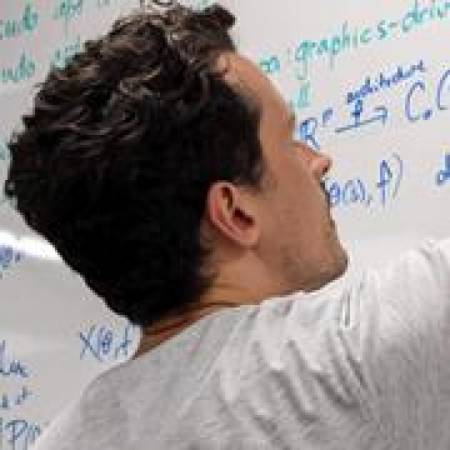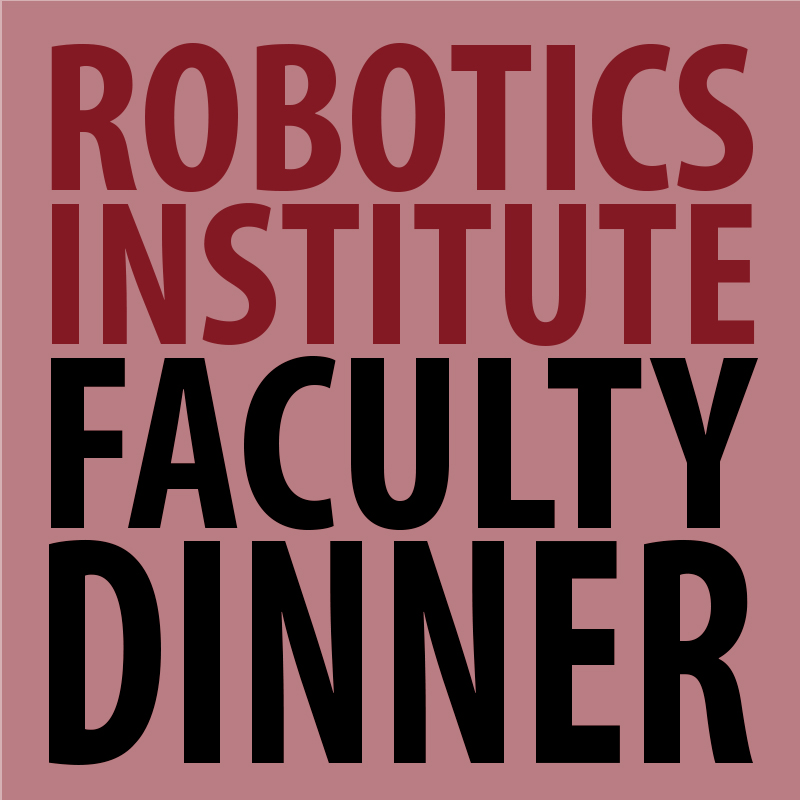Learning and Translating Temporal Abstractions across Humans and Robots
Abstract: Humans possess a remarkable ability to learn to perform tasks from a variety of different sources-from language, instructions, demonstration, etc. In each case, they are able to easily extract the high-level strategy to solve the task, such as the recipe of cooking a dish, whilst ignoring irrelevant details, such as the precise shape of [...]
Robust Incremental Smoothing and Mapping
Abstract: In this work we present a method for robust optimization for online incremental Simultaneous Localization and Mapping (SLAM). Due to the NP-Hardness of data association in the presence of perceptual aliasing, tractable (approximate) approaches to data association will produce erroneous measurements. We require SLAM back-ends that can converge to accurate solutions in the presence [...]
Carnegie Mellon University
3D Reconstruction using Differential Imaging
Abstract: 3D reconstruction has been at the core of many computer vision applications, including autonomous driving, visual inspection in manufacturing, and augmented and virtual reality (AR/VR). Because monocular 3D sensing is fundamentally ill-posed, many techniques aiming for accurate reconstruction use multiple captures to solve the inverse problem. Depending on the amount of change in these [...]
Learning with Structured Priors for Robust Robot Manipulation
Abstract: Robust and generalizable robots that can autonomously manipulate objects in semi-structured environments can bring material benefits to society. Data-driven learning approaches are crucial for enabling such systems by identifying and exploiting patterns in semi-structured environments, allowing robots to adapt to novel scenarios with minimal human supervision. However, despite significant prior work in learning for [...]
Learning Parameter-Efficient Quadrotor Dynamics Models
Abstract: Operation of quadrotors through high-speed, high-acceleration maneuvers remains a challenging problem due to the complex aerodynamics in this regime. While standard physical models suffice for control in near-hover conditions, the primary challenge in executing aggressive trajectories is obtaining a model for the quadrotor dynamics that adequately models the aerodynamic effects present, including lift, drag, [...]
RI Faculty Business Meeting
Meeting for RI Faculty. Discussions include various department topics, policies, and procedures. Generally meets weekly.
Carnegie Mellon University
Self-Supervising Occlusions For Vision
Abstract: Virtually every scene has occlusions. Even a scene with a single object exhibits self-occlusions - a camera can only view one side of an object (left or right, front or back), or part of the object is outside the field of view. More complex occlusions occur when one or more objects block part(s) of [...]
Multi-Sensor Robot Navigation and Subterranean Exploration
Predicting The Future and Linking the Past: Learning and Constructing Structured Models for Robotic Manipulation
Abstract: Intelligent robotic agents need to reason about the dynamics of their surrounding world, and use such dynamics reasoning to make future predictions for efficient task planning. In addition, it is also desirable for robots to associate past experience in their memories to their current observation, and conduct analogical reasoning to complete tasks at their [...]
Carnegie Mellon University
MSR Thesis Talk: Tushar Kusnur
Title: Search-based Planning for Sensor-based Coverage Abstract: Robots are excellent candidates for the dull, dirty, and dangerous jobs we do not want humans to perform. Today, these include inspection of large areas or structures, post-disaster assessment, and surveillance. Assessing the aftermath of the recent Fern Hollow bridge collapse in Pittsburgh is one such example. Many [...]
Human-in-the-loop Model Creation
Abstract: Deep generative models make visual content creation more accessible to novice users by automating the synthesis of diverse, realistic content based on a collected dataset. However, the current machine learning approaches miss several elements of the creative process -- the ability to synthesize things that go far beyond the data distribution and everyday experience, [...]
Robotic Interestingness via Human-Informed Few-Shot Object Detection
Abstract: Interestingness recognition is crucial for decision making in autonomous exploration for mobile robots. Previous methods proposed an unsupervised online learning approach that can adapt to environments and detect interesting scenes quickly, but lack the ability to adapt to human-informed interesting objects. To solve this problem, we introduce a human-interactive framework, AirInteraction, that can detect [...]
Towards a formal theory of deep optimisation
Abstract: Precise understanding of the training of deep neural networks is largely restricted to architectures such as MLPs and cost functions such as the square cost, which is insufficient to cover many practical settings. In this talk, I will argue for the necessity of a formal theory of deep optimisation. I will describe such a [...]
Carnegie Mellon University
MSR Thesis Talk: Nikhil Angad Bakshi
Title: See But Don't Be Seen: Towards Stealthy Active Search in Heterogeneous Multi-Robot Systems Abstract: Robotic solutions for quick disaster response are essential to ensure minimal loss of life, especially when the search area is too dangerous or too vast for human rescuers. We model this problem as an asynchronous multi-agent active-search task where each robot aims [...]
Carnegie Mellon University
MSR Thesis Talk: Yves Georgy Daoud
Title: Spatial Tasking in Human-Robot Collaborative Exploration Abstract: This work develops a methodology for collaborative human-robot exploration that leverages implicit coordination. Most autonomous single- and multi-robot exploration systems require a remote operator to provide explicit guidance to the robot team. Few works consider how to integrate the human partner alongside robots to provide guidance in the [...]
Carnegie Mellon University
MSR Thesis Talk: Ambareesh Revanur
Title: Towards Video-based Physiology Estimation Abstract: RGB-video based human physiology estimation has a wide range of practical applications in telehealth, sports and deep fake detection. Therefore, researchers in the community have collected several video datasets and have advanced new methods over the years. In this dissertation, we study these methods extensively and aim to address the [...]
Carnegie Mellon University
MSR Thesis Talk: Raghavv Goel
Title: Automating Ultrasound Based Vascular Access Abstract: Timely care of trauma patients is important to prevent casualties in resource-limited regions such as the battlefield. In order to treat such trauma using point of care diagnosis, medical practitioners typically use an ultrasound for vascular access or detection of subcutaneous splinters for providing critical care. The problem here is two-fold: [...]
Carnegie Mellon University
MSR Thesis Talk: Mayank Singh
Title: Analogical Networks: Memory-Modulated In-Context 3D Parsing Abstract: Recent advances in the applications of deep neural networks to numerous visual perception tasks have shown excellent performance. However, this generally requires access to large amount of training samples and hence one persistent challenge is the setting of few-shot learning. In most existing works, a separate parametric neural [...]
Carnegie Mellon University
Learning with Diverse Forms of Imperfect and Indirect Supervision
Abstract: Powerful Machine Learning (ML) models trained on large, annotated datasets have driven impressive advances in fields including natural language processing and computer vision. In turn, such developments have led to impactful applications of ML in areas such as healthcare, e-commerce, and predictive maintenance. However, obtaining annotated datasets at the scale required for training high [...]
Carnegie Mellon University
MSR Thesis Talk: Yutian Lei
Title: ARC: AdveRsarial Calibration between Modalities Abstract: Advances in computer vision and machine learning techniques have led to flourishing success in RGB-input perception tasks, which has also opened unbounded possibilities for non-RGB-input perception tasks, such as object detection from wireless signals, point clouds, and infrared light. However, compared to the matured development pipeline of RGB-input [...]
FRIDA: Supporting Artistic Communication in Real-World Image Synthesis Through Diverse Input Modalities
Abstract: FRIDA, a Framework and Robotics Initiative for Developing Arts, is a robot painting system designed to translate an artist's high-level intentions into real world paintings. FRIDA can paint from combinations of input images, text, style examples, sounds, and sketches. Planning is performed in a differentiable, simulated environment created using real data from the robot [...]
Perception for High-Speed Off-Road Driving
Abstract: On-road autonomous driving has seen rapid progress in recent years with driverless vehicles being tested in various cities worldwide. However, this progress is limited to cities with well-established infrastructure and has yet to transfer to off-road regimes with unstructured environments and few paved roads. Advances in high-speed and reliable autonomous off-road driving can unlock [...]
Continual Learning of Compositional Skills for Robust Robot Manipulation
Abstract: Real world robots need to continuously learn new manipulation tasks in a lifelong learning manner. These new tasks often share sub-structures (in the form of sub-tasks, controllers) with previously learned tasks. To utilize these shared sub-structures, we explore a compositional and object-centric approach to learn manipulation tasks. While compositionality in robot manipulation can manifest [...]
Junior Faculty PhD Admissions Process Presentation
A presentation lead by David Wettergreen regarding the PhD Admission process.
Carnegie Mellon University
MSR Thesis Talk: Samuel Ong
Title: Data-Driven Slip Model for Improved Localization and Path Following applied to Lunar Micro-Rovers Abstract Micro-lunar rovers need to solve a slew of challenges on the Moon, with no human intervention. One such challenge is the need to know their location in order to navigate and build maps. However, localization is challenging on the moon due [...]
Computational Interferometric Imaging
Abstract: Imaging systems typically accumulate photons that, as they travel from a light source to a camera, follow multiple different paths and interact with several scene objects. This multi-path accumulation process confounds the information that is available in captured images about the scene and makes using these images to infer properties of scene objects, such [...]
Making AI trustworthy and understandable by clinicians
Abstract: Understandable-AI techniques facilitate to use of AI as a tool by human experts, giving humans insight into how AI decisions are made thereby helping experts discern which AI predictions should or shouldn’t be trusted. Understandable techniques may be especially useful for applications with insufficient validation data for regulatory approval, for which human experts must remain the final decision [...]
Towards Interactive Radiance Fields
Abstract: Over the last years, the fields of computer vision and computer graphics have increasingly converged. Using the exact same processes to model appearance during 3D reconstruction and rendering has shown tremendous benefits, especially when combined with machine learning techniques to model otherwise hard-to-capture or -simulate optical effects. In this talk, I will give an [...]
Robust and Context-Aware Real-Time Collaborative Robot Handling with Dynamic Gesture Commands
Abstract: Real-time collaborative robot (cobot) handling is a task where the cobot maneuvers an object under human dynamic gesture commands. Enabling dynamic gesture commands is useful when the human needs to avoid direct contact with the robot or the object handled by the robot. However, the key challenge lies in the heterogeneity in human behaviors [...]
Learning Representations for Interactive Robotics
In this talk, I will be discussing the role of learning representations for robots that interact with humans and robots that interactively learn from humans through a few different vignettes. I will first discuss how bounded rationality of humans guided us towards developing learned latent action spaces for shared autonomy. It turns out this “bounded rationality” is not a [...]
Motion Planning Around Obstacles with Graphs of Convex Sets
Abstract: In this talk, I'll describe a new approach to planning that strongly leverages both continuous and discrete/combinatorial optimization. The framework is fairly general, but I will focus on a particular application of the framework to planning continuous curves around obstacles. Traditionally, these sort of motion planning problems have either been solved by trajectory optimization [...]
RE2 Robotics: from RI spinout to Acquisition
Abstract: It was July 2001. Jorgen Pedersen founded RE2 Robotics. It was supposed to be a temporary venture while he figured out his next career move. But the journey took an unexpected course. RE2 became a leading developer of mobile manipulation systems. Fast forward to 2022, RE2 Robotics exited via an acquisition to Sarcos Technology and [...]
Equivalent Policy Sets for Learning Aligned Models and Abstractions
Abstract: Recent successes in model-based reinforcement learning (MBRL) have demonstrated the enormous value that learned representations of environmental dynamics (i.e., models) can impart to autonomous decision making. While a learned model can never perfectly represent the dynamics of complex environments, models that are accurate in the "right” ways may still be highly useful for decision [...]
Dynamic Route Guidance in Vehicle Networks by Simulating Future Traffic Patterns
Abstract: Roadway congestion leads to wasted time and money and environmental damage. Since adding more roadway capacity is often not possible in urban environments, it is becoming more important to use existing road networks more efficiently. Toward this goal, recent research in real-time, schedule-driven intersection control has shown an ability to significantly reduce the delays [...]
Enabling Self-sufficient Robot Learning
Abstract: Autonomous exploration and data-efficient learning are important ingredients for helping machine learning handle the complexity and variety of real-world interactions. In this talk, I will describe methods that provide these ingredients and serve as building blocks for enabling self-sufficient robot learning. First, I will outline a family of methods that facilitate active global exploration. [...]
Adaptive Robotic Assistance through Observations of Human Behavior
Abstract: Assistive robots should take actions that support people's goals. This is especially true as robots enter into environments where personal agency is paramount, such as a person's home. Home environments have a wide variety of "optimal' solutions that depend on personal preference, making it difficult for a robot to know the goal it should [...]
Perceiving Objects and Interactions in 3D
Abstract: We observe and interact with myriad of objects in our everyday lives, from cups and bottles to hammers and tennis rackets. In this talk, I will outline our group’s efforts towards understanding these objects and our everyday interactions with them in 3D. I will first focus on scaling 3D prediction for isolated objects across [...]
Understanding the Physical World from Images
If I show you a photo of a place you have never been to, you can easily imagine what you could do in that picture. Your understanding goes from the surfaces you see to the ones you know are there but cannot see, and can even include reasoning about how interaction would change the scene. [...]
Beyond Pick-and-Place: Towards Dynamic and Contact-rich Motor Skills with Reinforcement Learning
Abstract: Interactions with the physical world are at the core of robotics. However, robotics research, especially in manipulation, has been mainly focused on tasks with limited interactions with the physical world such as pick-and-place or pushing objects on the table top. These interactions are often quasi-static, have predefined or limited sequence of contact events and [...]
How Computer Vision Helps – from Research to Scale
Abstract: Vasudevan (Vasu) Sundarababu, SVP and Head of Digital Engineering, will cover the topic: ‘How Computer Vision Helps – from Research to Scale’. During his time, Vasu will explore how Computer Vision technology can be leveraged in-market today, the key projects he is currently leading that leverage CV, and the end-to-end lifecycle of a CV initiative - [...]
Adaptive-Anytime Planning and Mapping for Multi-Robot Exploration in Large Environments
Abstract: Robotic systems are being leveraged to explore environments too hazardous for humans to enter. Robot sensing, compute, and kinodynamic (SCK) capabilities are inextricably tied to the size, weight, and power (SWaP) constraints of the vehicle. When designing a robot team for exploration, the diversity and types of robots used must be carefully considered because [...]
Neural Radiance Fields with LiDAR Maps
Abstract: Maps, as our prior understanding of the environment, play an essential role for many modern robotic applications. The design of maps, in fact, is a non-trivial art of balance between storage and richness. In this thesis, we explored map compression for image-to-LiDAR registration, LiDAR-to-LiDAR map registration, and image-to-SfM map registration, and finally, inspired by [...]
Enabling Data-Efficient Real-World Model-Based Manipulation by Estimating Preconditions for Inaccurate Models
Abstract: This thesis explores estimating and reasoning about model deviation in robot learning for manipulation to improve data efficiency and reliability to enable real-robot manipulation in a world where models are inaccurate but still useful. Existing strategies are presented for improving planning robustness with low amounts of real-world data by an empirically estimated model precondition to guide [...]
Robust Adaptive Reinforcement Learning for Safety Critical Applications via Curricular Learning
Abstract: Reinforcement Learning (RL) presents great promises for autonomous agents. However, when using robots in a safety critical domain, a system has to be robust enough to be deployed in real life. For example, the robot should be able to perform across different scenarios it will encounter. The robot should avoid entering undesirable and irreversible [...]
Motion Matters in the Metaverse
Abstract: Abstract: In the early 1970s, Psychologists investigated biological motion perception by attaching point-lights to the joints of the human body, known as ‘point light walkers’. These early experiments showed biological motion perception to be an extreme example of sophisticated pattern analysis in the brain, capable of easily differentiating human motions with reduced motion cues. Further [...]
MSR Thesis Talk: Yichen Li
Title: Simulation-guided Design for Vision-based Tactile Sensing on a Soft Robot Finger Abstract: Soft pneumatic robot manipulators have garnered widespread interest due to their compliance and flexibility, which enable soft, non-destructive grasping and strong adaptability to complex working environments. Tactile sensing is crucial for these manipulators to provide real-time contact information for control and manipulation. [...]






























